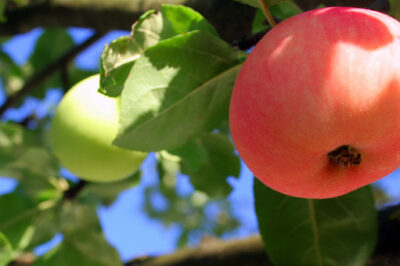Jesus taught His disciples that fruitfulness was His purpose for them. He told them, “‘You did not choose Me, but I chose you, and appointed you, that you should go and bear fruit, and that your fruit should remain'” (John 15:16, NASB). He also taught them that they could be fruitful only by learning to abide in Him.
The principle of abiding must be clearly understood so we avoid trying to bear fruit in our own strength. The Scriptures teach that these true Christian virtues are the fruit of the Spirit, not the fruit of human effort.
Many people today are attempting to produce the fruit of the Spirit through natural efforts and character-building. They exercise their wills to produce character through philosophy, education, ethics, anthropology, mental sciences or controlled environment. The results achieved from this human effort, though they may involve temporal good, are not the eternal fruitfulness that is produced by the work of the Holy Spirit.
The fruit of the Spirit is the character of Christ produced by the Spirit of Christ in the believer’s life. The more completely one is filled with the Holy Spirit, the greater will be the manifestation of the fruit of the Spirit in his life and work.
Only when a believer is full of the Holy Spirit, continually yielding to Him, can he exhibit the full fruition of Christian virtues. When Christ is formed in the believer through the indwelling of the Holy Spirit, true Christlike character will be as natural a result as pears growing on a pear tree. It follows then that if one who professes to be a Christian is devoid of fruit, he obviously does not have the Spirit of Christ. The fruit of the Spirit is produced automatically when we are yielded to the Holy Spirit and are walking in obedience to Him.
When Paul describes the fruit of the Spirit in writing to the Galatians, he is restating the Sermon on the Mount. This description is the ideal Christian life presented in concentrated expression.
Paul’s love chapter to the Corinthians (1 Corinthians 13) is the summary of his list of the fruit of the Spirit. He is teaching the very same principle of Christian life when he writes to the Philippians: “Whatever is true, whatever is honorable, whatever is right, whatever is pure, whatever is lovely, whatever is of good repute, if there is any excellence and if anything worthy of praise, let your mind dwell on these things” (Phil. 4:8). Any concept of Christianity that does not have as its basis the character of the fruit of the Spirit is a false teaching of Christianity.
The Scriptures clearly teach that natural man cannot hope to develop godly character without the work of the Holy Spirit in his life. Paul describes the striking contrast between the works of the flesh and the fruit of the Spirit:
“Now the deeds of the flesh are evident, which are: immorality, impurity, sensuality, idolatry, sorcery, enmities, strife, jealousy, outbursts of anger, disputes, dissensions, factions, envying, drunkenness, carousing, and things like these, of which I forewarn you just as I have forewarned you that those who practice such things shall not inherit the kingdom of God” (Gal. 5:19-21).
Spirit-filled men and women can be distinguished by their fruit in the same way that a carnal person can be identified by fleshly works. If we are abiding in Christ, the fruit of the Spirit will be manifest in our lives; it cannot be hidden. So, also, are the works of the flesh manifest in one who is not abiding in Christ.
A carnal person is one who is not governed by the indwelling Spirit of God. This egocentric, self-centered life manifests the works of the flesh, while a Christ-centered life manifests the fruit of the Spirit.
The great struggle within each believer is the struggle between self and Christ. If self wins, it becomes the central force of life, causing a person to be completely self-centered. Every descriptive characteristic of a self-centered person starts with the word “self”: selfish, self-pitying, self-glorying, perhaps even self-hating. The list of “self” words seems unending.
If Christ wins this battle against our self-life, He becomes the center of our personalities, and we become Christ-centered. The happy consequence of a Christ-centered life is the manifestation of the fruit of the Spirit.
The principle of fruit-bearing is a “life-principle.” Life develops from a life-source; it cannot be manufactured. Fruit is not made; it grows as the requirements of the life-principle are met. In contrast, the works of the flesh are described in the Scriptures as a negative result of human effort without the Holy Spirit.
The Scriptures clearly teach the life-principle involved in bearing fruit. The flesh can produce nothing but evil works, while the Holy Spirit produces Christ-life fruit. The former requires self-effort and results in death; the latter requires obedience to the Holy Spirit and produces life and peace.
Dr. Fuchsia Pickett ministered for over 50 years. She was an author, well-known Bible teacher and considered a mother in the faith in the charismatic movement. She passed away in 2004.







Leave a Comment
You must be logged in to post a comment.